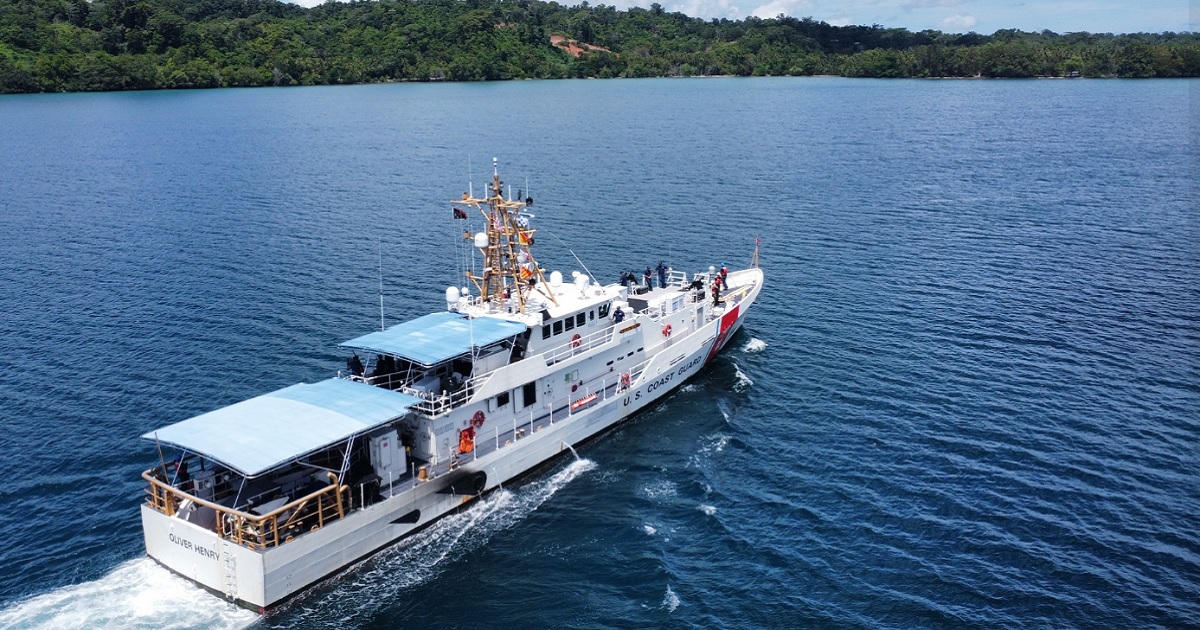The Solomon Islands, which recently negotiated a security agreement with China, denied entry to a U.S. Coast Guard cutter.
The cutter Oliver Henry, which is based in Guam, was scheduled to stop at Guadalcanal, Lt. Kristin Kam, a spokeswoman for the 14th Coast Guard District in Honolulu, wrote in an email, according to Stars and Stripes.
“The Government of the Solomon Islands did not respond to the U.S. Government’s request for diplomatic clearance for the vessel to refuel and provision in Honiara,” Kam wrote, referring to the capital city of the Solomon Islands on the island of Guadalcanal.
“Accordingly, CGC Oliver Henry diverted to Papua New Guinea to refuel and provision.”
The Coast Guard did not say exactly when the cutter was denied access port access in the Solomons, citing security reasons, but Stars and Stripes noted that the Oliver Henry arrived in Port Moresby, Papua New Guinea, on Tuesday.
The move was interpreted as evidence that the partnership between China and the government of the Solomons is pulling the island chain into China’s orbit.
#China is now running the #SolomonIslands. See this: https://t.co/xlJYki2ZVC.
— Gordon G. Chang (@GordonGChang) August 26, 2022
China is gaining ground in its efforts to gain dominance in the Pacific – “Solomon Islands denies port call for Guam-based US Coast Guard cutter” https://t.co/1W4r5DmSDq
— James Hutton (@JEHutton) August 27, 2022
The cutter arrived without incident in Port Moresby, according to a Coast Guard news release cited by Stars and Stripes.
The visit followed a patrol in “parts of the Coral Sea and the Solomon Islands and Papua New Guinea Exclusive Economic Zones,” the release stated, according to Stars and Stripes.
“The U.S. Department of State is in contact with the Government of the Solomon Islands and expect all future clearances will be provided to U.S. ships,” Kam wrote, according to Stars and Stripes.
Whatever the current situation, the United States and the Solomon Islands share a deep tie in history.
In August 1942, the Solomons were a major part of what would become America’s island-hopping strategy to defeat Japan in World War II.
? Thread – #OnThisDay 1942 the Battle of the Eastern Solomons came to a close, the third major carrier clash of the Pacific War taking place in the waters northeast of Guadalcanal it was a short-term US Navy victory and led to further losses of skilled Japanese carrier aviators. pic.twitter.com/zv0B68Dgd4
— Jordan Cary (@JHistoryC) August 25, 2022
#OnThisDay 1942, 31 F4F Wildcats of MAG-23 were the first aircraft to land at Henderson Field, on Guadalcanal. #WWII #USMC #SemperFidelis #Marines pic.twitter.com/eYwZKykOJx
— Buck Miller (1921-2018) (@usmc1940) August 20, 2022
The U.S. closed its embassy in the island chain in 1993 and left its diplomatic relations with the country to be handled by the Embassy in Port Moresby in Papua New Guinea. In February, the U.S. State Department announced plans to reopen its embassy in an effort to strengthen ties to the country and counter China’s growing presence, according to The Associated Press.
In 2019, the Solomons opened formal diplomatic relations with China, jettisoning Taiwan in the process.
Earlier this month, Deputy Secretary of State Wendy Sherman and Ambassador to Australia Caroline Kennedy traveled to the islands to mark the 80th anniversary of the Battle of Guadalcanal.
Solomon Islands Prime Minister Manasseh Sogavare did not attend the event, an action labeled as a “snub.”
In April, the Solomons announced a new security agreement with China, The Washington Post reported at the time.
Even before that announcement, security talks between the two countries prompted fears in the region that China might use the islands to build a military installation, according to The New York Times.
“This is deeply problematic for the United States and a real cause of concern for our allies and partners,” Charles Edel, the Australia chair at the Center for Strategic and International Studies, told the Times.
“The establishment of a base in the Solomon Islands by a strategic adversary would significantly degrade Australia and New Zealand’s security, increase the chances of local corruption and heighten the chances of resource exploitation,” he said.
This article appeared originally on The Western Journal.

























 Continue with Google
Continue with Google